 Petzlover
PetzloverBracco Italiano is originated from Italy but Gran Mastin de Borinquen is originated from United States. Both Bracco Italiano and Gran Mastin de Borinquen are having almost same height. Bracco Italiano may weigh 28 kg / 61 pounds lesser than Gran Mastin de Borinquen. Both Bracco Italiano and Gran Mastin de Borinquen has almost same life span. Bracco Italiano may have less litter size than Gran Mastin de Borinquen. Both Bracco Italiano and Gran Mastin de Borinquen requires Low Maintenance.
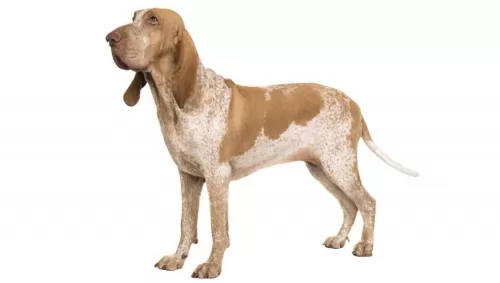 The attractive and popular breed in Italy, the Bracco Italiano was used for tracking and retrieving, evolving in Piedmont and Lombardy. It is believed the Bracco Italiano came about from crossing the Segugio with the ancient Asiatic Mastiff.
The attractive and popular breed in Italy, the Bracco Italiano was used for tracking and retrieving, evolving in Piedmont and Lombardy. It is believed the Bracco Italiano came about from crossing the Segugio with the ancient Asiatic Mastiff.
There are people however, who believe that the breed goes back to the St Hubert Hound, but it is certain that both hounds and gundogs are part of the breed’s ancestry. The dog only arrived in Britain in the last decade of the 20th century.
The Gran Mastín de Borinquen is also referred to as the Puerto Rican Mastiff or the Mastín Borincano and is actually native to Puerto Rico.
The dog seems to have originated long ago already during the 16th century. Its a dog that descends from a number of dogs, and the dog from these crosses became a huge, ferocious dog.
For centuries the Gran Mastin de Borinquen was used to protect the estates of the Spanish nobility. Today the breed is considered rare and it isn't recognized by any major kennel club as a standardized breed.
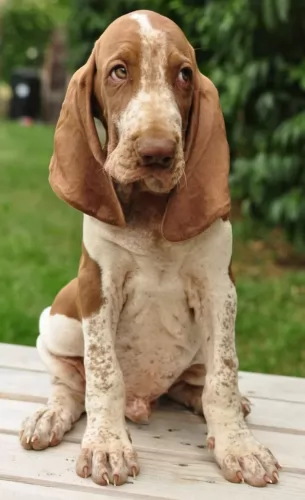 The Bracco Italiano is a large athletic, muscular dog. He stands at 58–67cm, weighing anything between 25 – 40kg. He reminds one somewhat of a German Short-haired Pointer. He has long ears and a serious expression, and this reminds one of a Bloodhound. He has short, shiny hair with his coat being white and chestnut or orange. The tail of the Bracco Italiano has always been docked, giving him an attractive, distinctive look but with rules and regulations coming in regarding docking, the long tail is often left intact. His eyes are brown.
The Bracco Italiano is a large athletic, muscular dog. He stands at 58–67cm, weighing anything between 25 – 40kg. He reminds one somewhat of a German Short-haired Pointer. He has long ears and a serious expression, and this reminds one of a Bloodhound. He has short, shiny hair with his coat being white and chestnut or orange. The tail of the Bracco Italiano has always been docked, giving him an attractive, distinctive look but with rules and regulations coming in regarding docking, the long tail is often left intact. His eyes are brown.
Braccos are wonderful pets – they are intelligent, loving, gentle and amicable, getting on well with children in the home as well as with other pets. Socialize and train them and they become gentle and obedient. They long to be involved with their human family and will adapt to life in the city or the country so long as they are made to feel like family. He is alert and makes a good watchdog. As with most other dogs, they can’t be bought, loved as a puppy and then ignored and left to themselves when they grow into adults.
The Gran Mastin de Borinquen is a large dog. He stands roughly between 56 and 71cm and weighs in at between 41 and 68kg.
He is well muscled with a large head and short floppy ears but until recently the ears have always been cropped. The nose is black, the eyes dark brown and small and he has an alert, intelligent look to him.
These days the tail is kept long and it is held low. The coat is short in length and harsh with the colour being fawn, black, cream or brindle. You'll also find some small inclusions of white on the coat.
Loyal and protective, the Gran Mastin de Borinquen forms a strong bond with his master, becoming aggressive with any stranger who comes too close to his owner.Its a dog that has been taught to be aggressive so he isn't the best pet to choose if you have children in the home. He isn't the best dog either for first time dog owners, particularly if the person isn't a strong, firm person around him, showing who is boss.
However there are people who have had their pet trained and socialized and who claim he makes a wonderful family pet. The way a dog is brought up can play a large role in the way he turns out.
Train and socialize your Gran Mastin de Borinquen because he is inclined to be strong-willed and for a large, aggressive type of dog, you want him to be obeying you.
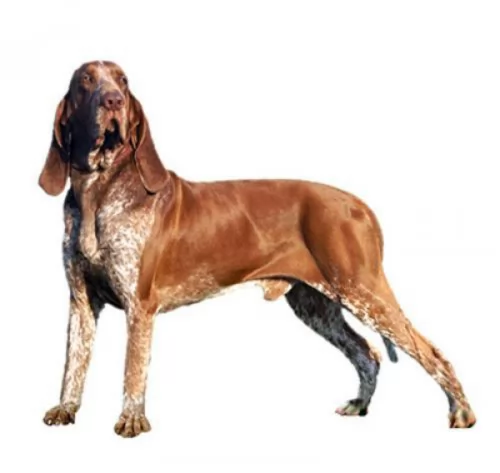 The gentle, amicable Bracco Italiano is a versatile dog that can be a super sport companion for active people and it can also be an exceptional companion for families and older people. He has a sweet, gentle expression and his amicable nature makes him easy to love. He is alert though, and therefore can be both protector and friend at the same time.
The gentle, amicable Bracco Italiano is a versatile dog that can be a super sport companion for active people and it can also be an exceptional companion for families and older people. He has a sweet, gentle expression and his amicable nature makes him easy to love. He is alert though, and therefore can be both protector and friend at the same time.
Overall, this easy going dog with his low maintenance coat can make an excellent 4-legged addition to any family.
Noble, courageous and loyal, a trained, socialized Gran Mastin de Borinquen who has learned simple commands such as sit, down, come, stay, lie-down and heel will be an absolute pleasure to have around and be a well behaved, obedient companion for you.
Your Gran Masin is a dignified, loving animal, but because of his size and his origin, bred to be aggressive, he isn’t looked upon as the first choice when you’ve got small children in the home. With the right owner – fair, firm and loving - he makes a splendid pet.
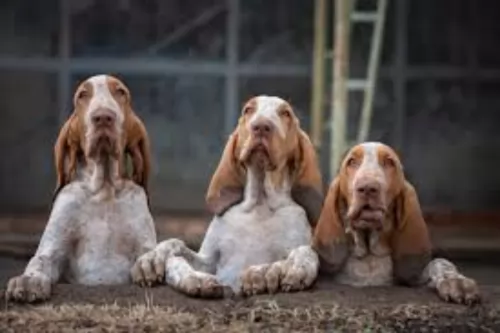 There don’t appear to be any major health issues with your Bracco Italiano and he can live to be 12, 13 or 14 years of age. Because he is a large breed however, you will need to watch out for hip dysplasia.
There don’t appear to be any major health issues with your Bracco Italiano and he can live to be 12, 13 or 14 years of age. Because he is a large breed however, you will need to watch out for hip dysplasia.
Hip dysplasia is a common skeletal disease with dogs and larger dogs have the genetic predisposition for hip dysplasia. Your dog can develop joint inflammation with pain and lameness.
Other health problems to look out for include kidney disease (Amaloidosis), cherry eye which results in dry eye. If you want to buy a Bracco Italiano, you should ask the breeder about the medical history of the parents.
Your Gran Mastin de Borinquen can get to 12 years of age with good care. Mastiff-type dogs like this can be prone to eye problems as well as having to tackle joint problems such as hip dysplasia.
Other issues that can appear in this breed, but are unlikely be cancer, bloat, hypothyroidism and von Willebrand’s Disease which is a bleeding disorder.
Remember to do daily inspections of your Gran Mastin de Borinquen for fleas and ticks, particularly during the Summer month. Toxins introduced into the body by a tick bite for instance can make your pet seriously ill so that veterinary intervention is required.
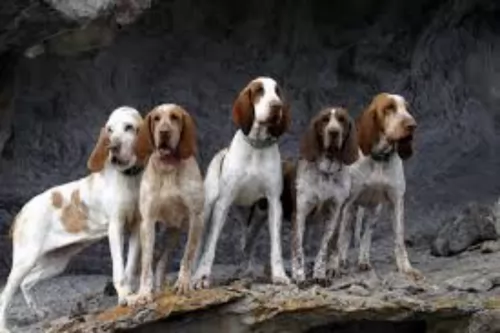 These dogs are moderate shedders so he will simply need a good brushing twice a week to ensure the coat is kept shiny and free from loose hairs. Nails should be clipped from time to time and he will also need to have his long ears checked for cleanliness. Long-eared dog breeds are more susceptible to canine ear infections.
These dogs are moderate shedders so he will simply need a good brushing twice a week to ensure the coat is kept shiny and free from loose hairs. Nails should be clipped from time to time and he will also need to have his long ears checked for cleanliness. Long-eared dog breeds are more susceptible to canine ear infections.
The Bracco is a large dog and therefore he will require a high quality, large-breed dog food formula. Your veterinarian can even recommend a quality commercially manufactured food for large, energetic dogs and which comes with all the vitamins and minerals required for such a breed.
Your vet will recommend you steer clear of foods with cheap fillers, lots of preservatives, sugar and colorants. He has a glossy, dense short coat and you want to ensure he gets raw meat, rice and vegetables from time to time to ensure that the beautiful coat never becomes dull and dry.
Cool, fresh water must always be available to him. Diet and nutrition is an important decision for your pet as it will ultimately affect his long term health.
The Gran Mastin de Borinquen, with his short coat, is a relatively low maintenance breed. Brush him at least twice a week to keep the coat free of loose hairs. Other grooming requirements are keeping his ears clean and dry. You can ask about alcohol wipes at your local pet shop to use in his ears. Check the nails too and remember to brush his teeth a couple of times a week to avoid dental decay.
You won't find the Gran Mastin de Borinquen being a particularly high energy dog but he also isn't a couch potato. If you enjoy a walk every day for your own good health, include him in these walks and give him a game of ball every now and again.
This Mastiff -type dog is large, and they tend to be fairly lazy, not using up great deals of energy. Young dogs however use up more energy and will require a diet with good quality protein.
Dogs that have been spayed or neutered as well as senior dogs will require less calories. If you buy commercially manufactured food, check the labels carefully and buy high quality food for a large breed.
Don't just feed your Gran Mastin kibble everyday but alternate it sometimes, mixing in some raw meat into his kibble or mixing in some cooked chicken, rice and vegetables.